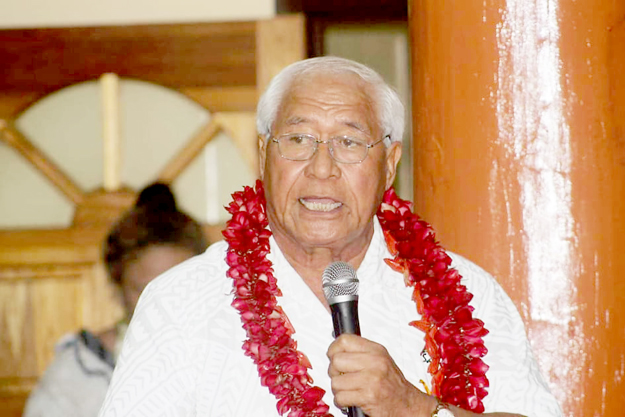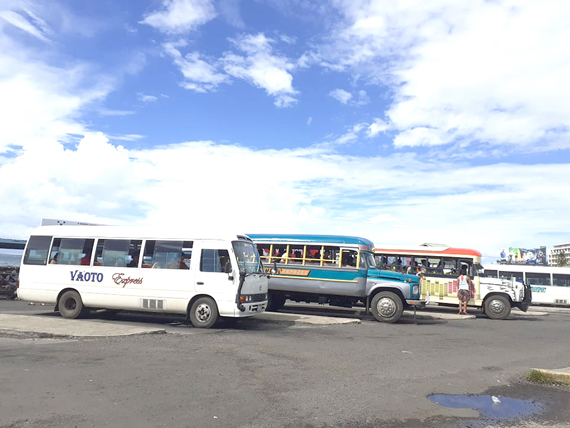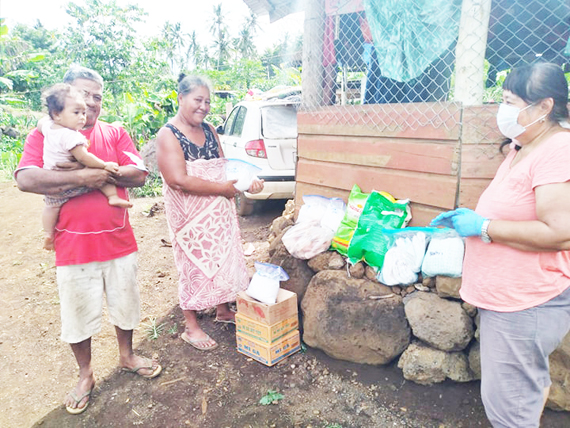

A concern that started to rear its worrying head as the lockdown restrictions continued were in the domestic sector with the unity and wellbeing of families at stake.
The Samoa Victim Support Group,SVSG, was the first to make noises about the risk to family unity as the effects of the lockdown that included loss of jobs started to hurt.
SVSG began to note the disturbing trend early in the lockdown period from the steady increase of callers on their Help Line.
It was convinced of the link between the pandemic uncertainties and on the lives and livelihood of the families.
Here is what the community service organisation expressed in a statement :
As people have lost jobs or have lost access to employment, domestic violence and the need for welfare support have increased.
There were 21 domestic violence cases reported through the Help Line as a result of distress between couples due to loss of employment, and the inability to support the family’s daily needs. Being in close proximity to each other 24/7 due to the lockdown and the loss of employment had further fueled tensions and arguments between couples.
Fifteen other cases called in for welfare assistance as the tension from being without a job had taken its toll, especially on the underprivileged families. Two of these cases have been complaints against people stealing others livelihood out of hunger
At the Campus of Hope, 5 mothers and a total of 16 children were fed, clothed and provided temporary shelter by SVSG during this two weeks period. They were sheltered in isolation at the Campus training centre away from the children’s dormitories. There were 9 children age 1 month – 1 year (4 boys and 5 girls); and 7 children age 1 – 8 years old (4 boys and 3 girls). All of these mothers and their children were victims of domestic violence. They were able to reach out for assistance through the Help Line.
The deterioration inside family unit was not lost on the Minister of Women and Social Community Development , Tuitama Dr. Talalelei Tuitama.
His appeal through the village family network under his ministerial care was for a change in the normal pace of daily living.
Tuitama wanted to alert the families to the bad times ‘ the national economy was starting to feel and he expressed it publicly in a Newsline Samoa report :
“We cannot continue with the normal lifestyle prior to the pandemic restrictions, families must align their daily needs with what their current income earnings,” Tuitama counseled in an appeal under his social community portfolio.
The Minister’s reaction is prompted by the reported jump in domestic violence noted by the police and the Samoa Victim Support Group, since the country went into emergency lockdown.
The source of violence is tracked to the strain of the drop in regular family income for daily upkeep.
Tuitama is annoyed by the violence that he felt was unnecessary if people used their ‘God given brains’ to make intelligent decisions about their financial situations.
“There’s a long list of options they can take like use less electricity and water, as well as budget wisely on the family food shopping instead of going on a buy spree when it is not needed.
“There’s no need to get into domestic disputes when the family budget does not add up.”
The Minister feels for the women at the reports of domestic violence and it is a concern he calls on the authority of the chiefs and orators to look into.
A UN survey of the COVID-19 economic impact on Samoa’s economy was revealed when it was made public.
The forecast was not very encouraging based on the findings from the survey made public in this statement :
68 percent of Samoan respondents to a survey say they have lost income, almost half of households have at least one unemployed member and 71 percent of people are having trouble repaying debts as a result of the COVID-19 pandemic and related restrictions.
The online survey of 286 Samoans, which was conducted by the United Nations, says that COVID-19 has hit the pockets and wallets of Samoans, reducing revenue, increasing debt and for some households – affecting food security. Close to half of respondents say that the decline of domestic and international travel has led to a reduction in earnings. 23 percent said their employer has had to close a business, and 15 percent have had their job terminated. The other most common reasons cited for a fall in income included the interruption of social activities and the unavailability of stock for market vendors and shops. Some respondents said they quit their jobs because their employer changed employment conditions due to the crisis.
And the survey indicates that Samoans may not be optimistic about the future, with 75 percent of respondents saying that if the state of emergency continues for another two months, they expect a continued decline in their personal and household income. Only 19.6 percent of respondents said that those in their household who lost income have been able to find a new source of revenue.
“Samoa acted quickly and decisively to implement a state of emergency that has prevented the spread of COVID-19 and saved many lives,” said Simona Marinescu, UN Resident Coordinator for the Cook Islands, Niue, Samoa and Tokelau. ”However, Samoa like any other country, has been affected in multiple ways by the COVID-19 pandemic whose socio-economic cost continues to grow. Although we have avoided a health crisis, all indicators suggest that a protracted economic crisis is on the horizon. Poverty may rise and the hard work done in recent years to advance many of the sustainable development goals could be reversed, unless we take action now to protect the most vulnerable.”


Despite the discouraging forecast there were still a few good moments to restore hope while everyone was trying to adjust and adapt to the changes.
The extension of operating times for public transport and the easing of over restriction return the smile to many of the bus drivers, mostly in thankful relief.
Fears of overloading forced by the restrictions from the normal run of 30 passengers to 20 became a nightmare for bus drivers.
Here is how that turned out when first reported on Newsline Samoa :
Drivers admitted to having a dreadful time trying to keep the number of passengers within the limit.
A watchful police bouncing on them with fines for overloading was one reason.
Angry and threatening passengers left behind so as not to exceed the legal limit was another.
Overloading fines that started with $200 for the first offence and more for repeats was the worst.
